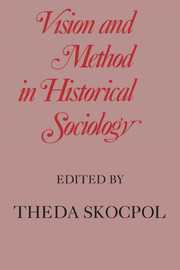Book contents
- Frontmatter
- Contents
- Preface
- 1 Sociology's Historical Imagination
- 2 The Social and Historical Landscape of Marc Bloch
- 3 Beyond the Economistic Fallacy: The Holistic Social Science of Karl Polanyi
- 4 Configurations in History: The Historical Sociology of S. N. Eisenstadt
- 5 Theoretical Generalization and Historical Particularity in the Comparative Sociology of Reinhard Bendix
- 6 Destined Pathways: The Historical Sociology of Perry Anderson
- 7 E. P. Thompson: Understanding the Process of History
- 8 Charles Tilly's Collective Action
- 9 The World System of Immanuel Wallerstein: Sociology and Politics as History
- 10 Discovering Facts and Values: The Historical Sociology of Barrington Moore
- 11 Emerging Agendas and Recurrent Strategies in Historical Sociology
- An Annotated Bibliography on Methods of Comparative and Historical Sociology
- Notes on the Contributors
5 - Theoretical Generalization and Historical Particularity in the Comparative Sociology of Reinhard Bendix
Published online by Cambridge University Press: 05 June 2012
- Frontmatter
- Contents
- Preface
- 1 Sociology's Historical Imagination
- 2 The Social and Historical Landscape of Marc Bloch
- 3 Beyond the Economistic Fallacy: The Holistic Social Science of Karl Polanyi
- 4 Configurations in History: The Historical Sociology of S. N. Eisenstadt
- 5 Theoretical Generalization and Historical Particularity in the Comparative Sociology of Reinhard Bendix
- 6 Destined Pathways: The Historical Sociology of Perry Anderson
- 7 E. P. Thompson: Understanding the Process of History
- 8 Charles Tilly's Collective Action
- 9 The World System of Immanuel Wallerstein: Sociology and Politics as History
- 10 Discovering Facts and Values: The Historical Sociology of Barrington Moore
- 11 Emerging Agendas and Recurrent Strategies in Historical Sociology
- An Annotated Bibliography on Methods of Comparative and Historical Sociology
- Notes on the Contributors
Summary
The work of Reinhard Bendix embodies a distinctive sense of the fundamental purpose of sociological work. In 1951, virtually at the outset of his scholarly career, in the programmatic essay “Social Science and the Distrust of Reason,” he distanced himself from a conception of social science that acknowledges no other rationale for its pursuits than the validity of specific findings and their possible usefulness for varied social purposes. This common view, Bendix argued, makes a fetish of science and relinquishes belief in a reason transcending empiricism, which since the Enlightenment had shaped ideas of the good society and determined the significance of questions and findings in social investigation. Bendix understood the intellectual developments – from Bacon to Marx, Nietzsche, and Freud – that led to the destruction of this faith in reason, yet he was concerned that “we pay for the greater empiricism of modern social science with unconscious and uncritical subordination of intellectual endeavor to the social and political forces of our time.”
The critical position he advocates is not primarily defined in substantive terms. With Max Weber, Bendix views intellectual clarification, human enlightenment, as the central task of the social sciences. In a formulation reminiscent of German idealism of the late nineteenth century, he urges that we “take our stand on the ground that our intellectual life is enriched by worthwhile research in the social sciences. Such research is a token of high civilization, worth preserving as an integral part of our quest for knowledge.”
- Type
- Chapter
- Information
- Vision and Method in Historical Sociology , pp. 129 - 169Publisher: Cambridge University PressPrint publication year: 1984
- 6
- Cited by

